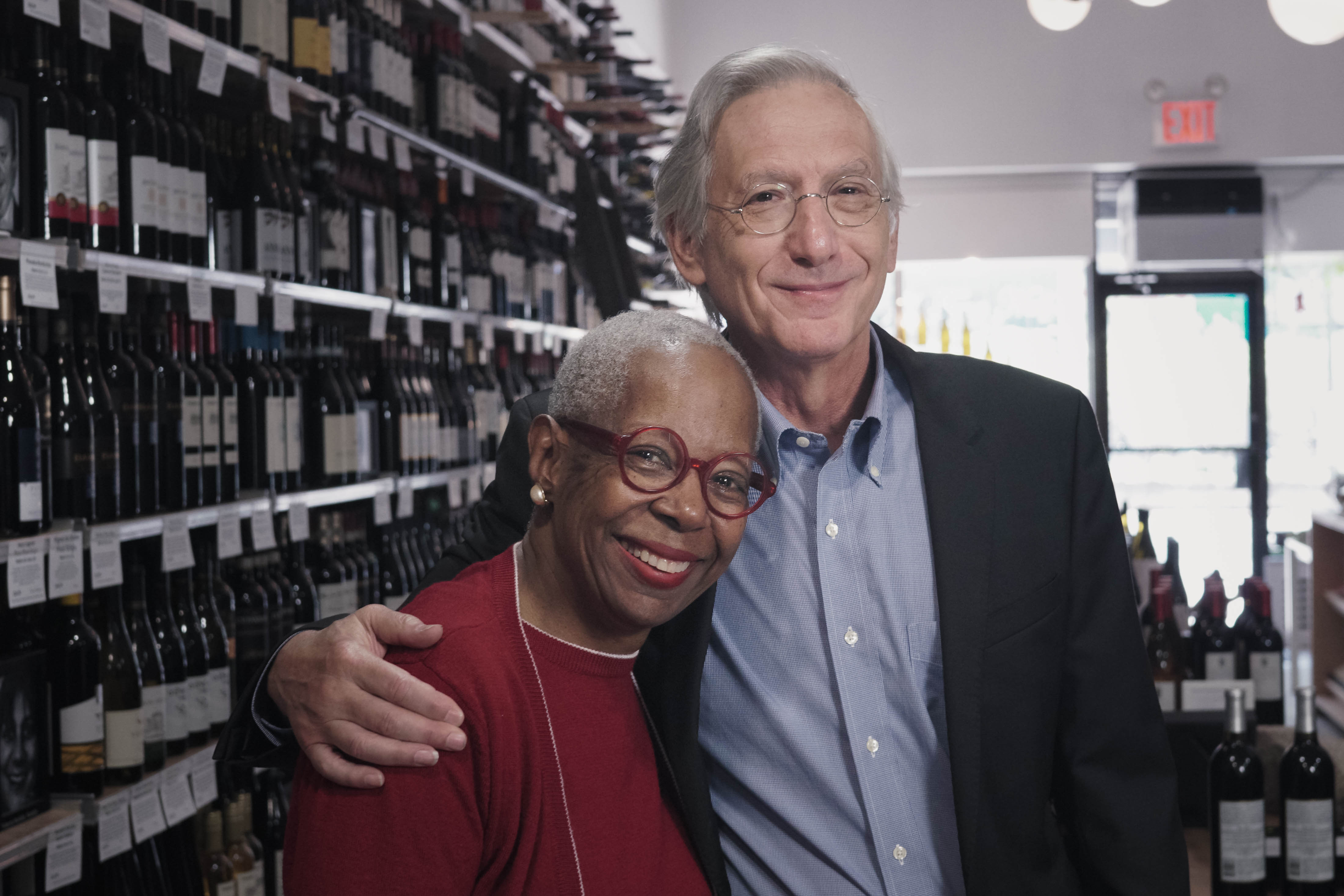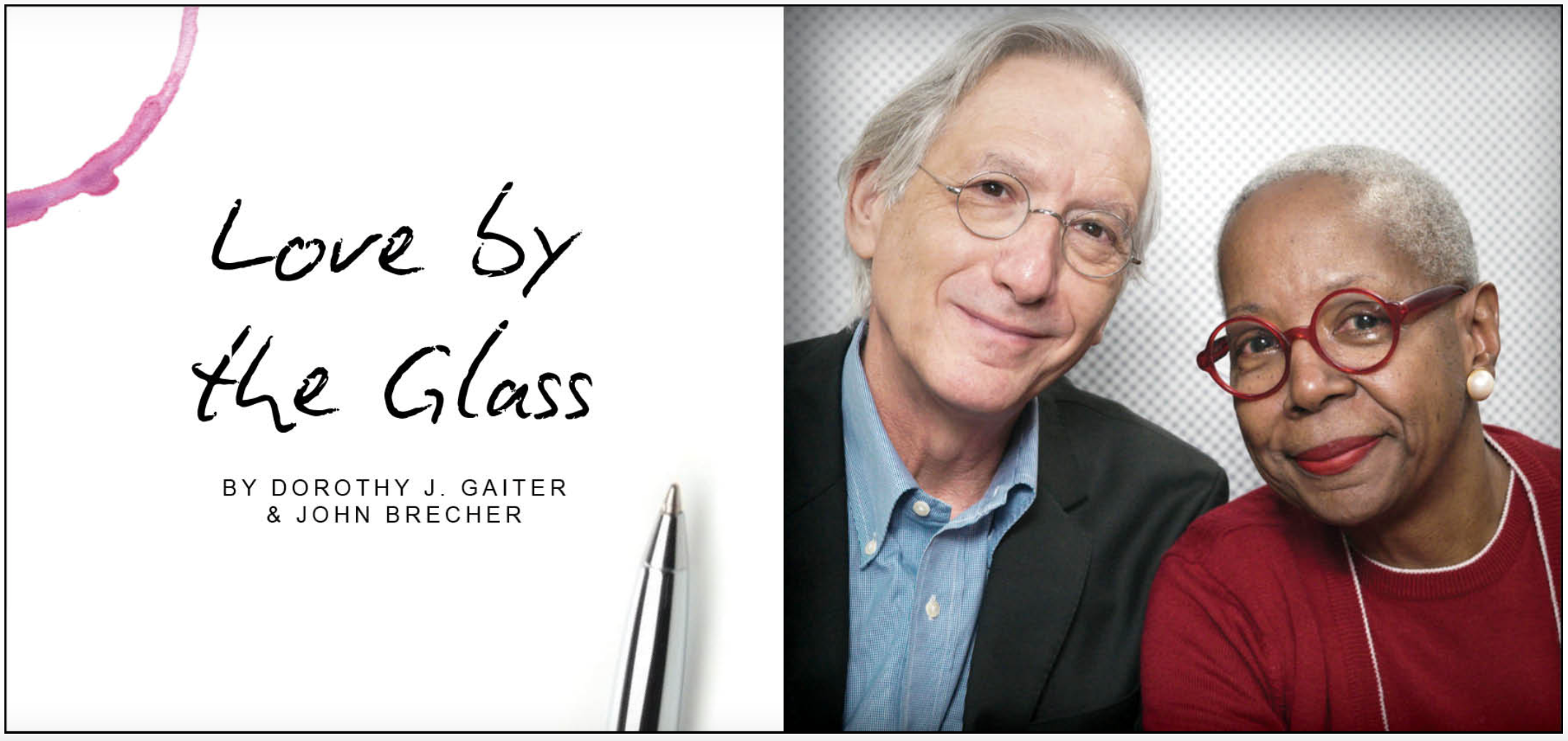
We are often asked how to get into the wine industry. For years, we answered, “We have no idea. We’re in the journalism industry.” We weren’t bragging, although it remains a noble calling. We just wanted to clarify what we do and what we do not do. It’s been more than half a century now, and we’re still in the journalism business, although writing about wine is pretty far from the hard-news topics we focused on for decades. And today we can point to many organizations and programs that are helping people enter the wine industry. And by wine industry, we mean that writ large. There’s a cornucopia of occupations involved in delivering it from the ground to your lips. There are many paths.
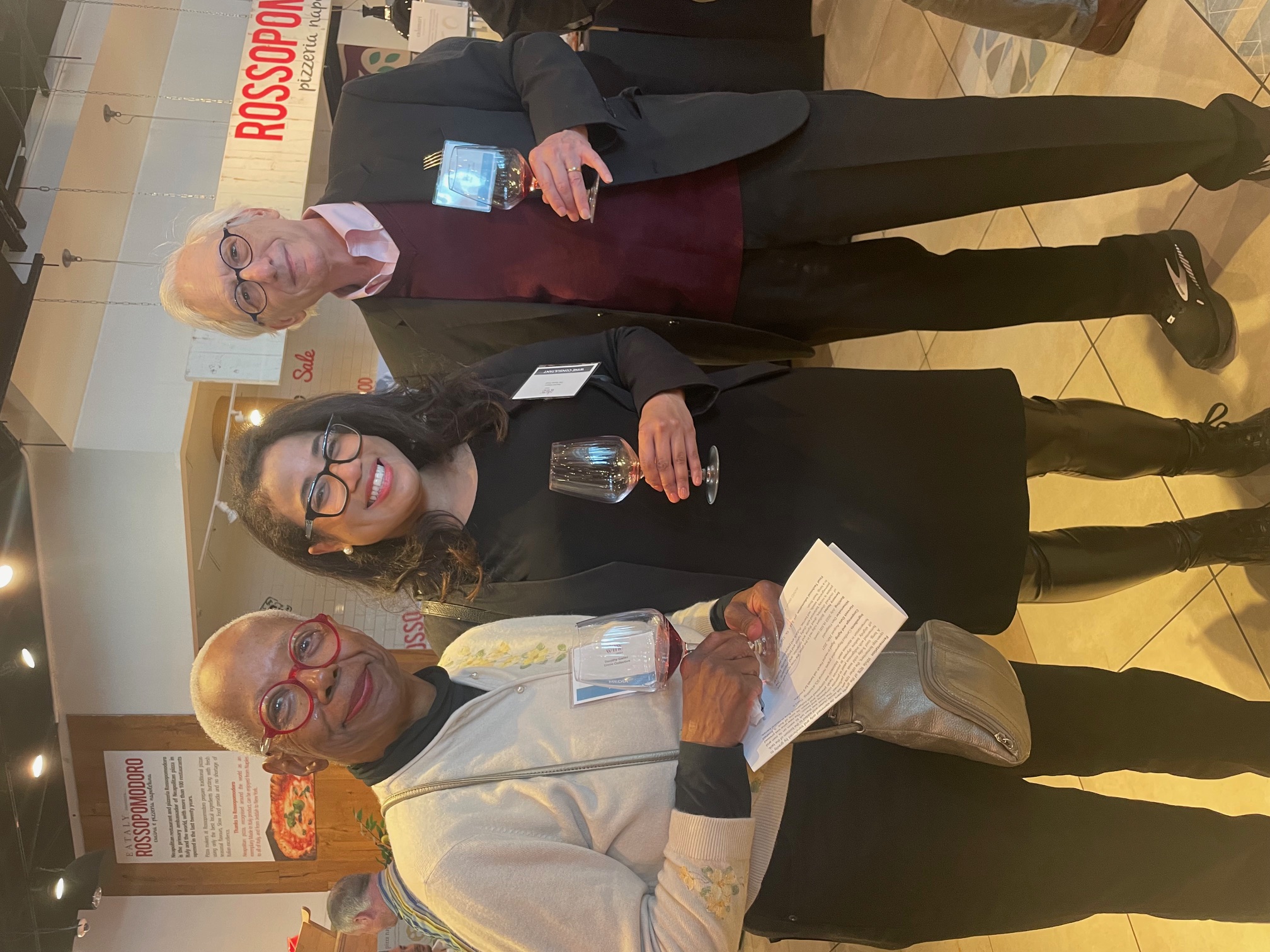 We recently met Rachel Allison, 34, who has a doctorate in wine flavor chemistry from Cornell University. A paper she co-authored there, about the formation of reductive, off aromas (rotten eggs) in canned wines, was selected 2024 Best Enology Paper by the American Society for Enology and Viticulture. The organization will celebrate her and her co-authors at this year’s conference in June in Portland. She works in Manhattan at a large management consulting company.
We recently met Rachel Allison, 34, who has a doctorate in wine flavor chemistry from Cornell University. A paper she co-authored there, about the formation of reductive, off aromas (rotten eggs) in canned wines, was selected 2024 Best Enology Paper by the American Society for Enology and Viticulture. The organization will celebrate her and her co-authors at this year’s conference in June in Portland. She works in Manhattan at a large management consulting company.
(Dottie and John with Rachel Allison at Slow Wine 2024 Tasting)
“I became a scientist because I wanted to learn about flavor. I had a lot of medical issues and food restrictions as a kid and I was always trying to avoid bland hospital food. When I found a research group that worked on flavors, it happened to be wine and grapes, and this gave me the entree to the broader wine world,” she told us. Her research involved “enhancing the flavor, quality, and sustainability of wine products, especially canned wines.”
That was a lot to unpack so we arranged to call her. When we did she was getting ready to fly to Denver for a friend’s wedding for which she was baking the wedding cake. “It’s been a minute since I had the time to do a baking project,” she said. “In grad school I baked birthday cakes for my friends, cakes to celebrate qualifying exams, graduations, other wedding cakes. My interest in baking is related to my interest in wine. Because of my food restrictions and chronic health issues, I learned how to bake when I was a kid so that I could have good things to eat. I learned about baking and chemistry. I like the precision of chemistry. And then I went on to study engineering. When you bake wedding cakes it’s a lot of engineering.” Check out the pictures of some of her custom-designed cakes and her research on canned wines at rachelballison.com (This conversation has been edited.)
Grape Collective: Are you the only science-minded person in your family?
Allison: I grew up in Montreal and Toronto. My parents met as undergraduates in geology. I know a disproportionate amount about rocks and soil types, which comes in handy with wine. Mom got her PhD in mining engineering, minerals, and my dad got an MBA in the operations kind of stuff. As an undergraduate, I did some internships in exploration geology, mining. [She has degrees in engineering chemistry and economics from Queen’s University in Kingston, Ontario.]
GC: How did you get from there to studying wine?
Allison: I had a very lucky Google search. When I was still an undergraduate engineering student in Canada, I had this moment of clarity. Oil and gas. That’s what you do if you study chemical engineering in Canada and I thought, there’s got to be some way to learn about food. I learned a lot about food when I was a kid because of my chronic illnesses. So I Googled food science summer programs and Cornell was the first result. I got my application together in a week and ended up getting matched to a lab that researched flavor chemistry that happened to focus on wine grapes. I kind of never left. I went back two summers in a row, 2010 and 2011, and then grad school.
GC: And….
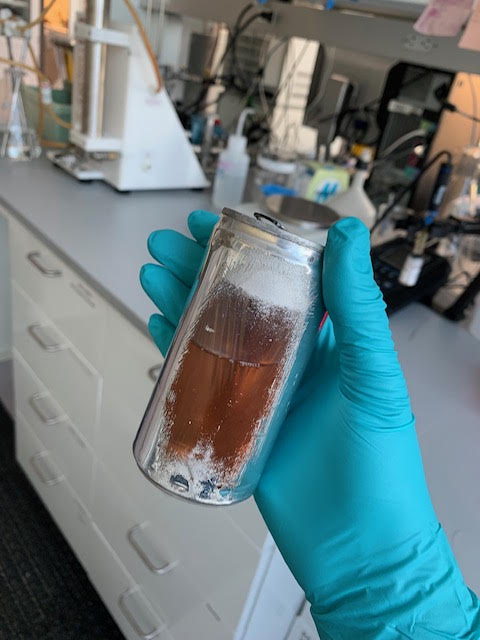 Allison: My parents didn’t drink wine but I did grow up in Canada and the drinking age is a little younger, 19. So when I was in college with friends, we’d go to a wine store together and buy a wine. My friends and I were in a food club. There’s a strong food culture in Prince Edward County, Ontario. So I went to some wine tastings. British Columbia is one of my favorite regions. It reminds me a little of Alsace, the Pinot Gris in particular. Cool-climate wines are close to my heart. I love especially intense, dry Riesling.
Allison: My parents didn’t drink wine but I did grow up in Canada and the drinking age is a little younger, 19. So when I was in college with friends, we’d go to a wine store together and buy a wine. My friends and I were in a food club. There’s a strong food culture in Prince Edward County, Ontario. So I went to some wine tastings. British Columbia is one of my favorite regions. It reminds me a little of Alsace, the Pinot Gris in particular. Cool-climate wines are close to my heart. I love especially intense, dry Riesling.
(Window into a wine can, Dr. Allison's lab demonstration)
The Okanagan Valley is beautiful wine country. It’s devastating what’s happened there with the freeze.
Cornell had a grad student wine tasting club, with viticulture and enology students and some hospitality students -- some from winemaking families, others who had worked harvests or were working in wine. People asked me, “What wines do you like?” I knew nothing about wine, truly nothing. But as an undergraduate in Canada, I drank a lot of Riesling. That’s what we grew a lot of in Ontario. It was like the entry wine that everyone drank. I thought it was a boring answer, a default wine, but people were impressed. They thought I knew what I was talking about.
[The list of awards and scholarships Allison has won is as long as your arm. She’s has a Wine & Spirits Education Trust Level 3 diploma with distinction and is thinking one day about going for a Master of Wine certification. Among others, she received the Roots Fund’s “Rooted in Education” Scholarship; “Women Behind the Wine” scholarship from a partnership between Women of the Vine and Spirits and Gallo; funding for multiple years through the Natural Sciences and Engineering Research Council of Canada; Queen’s University Chancellor’s Scholarship; and scholarships from Cornell, where she co-founded the Graduate Wine Society and competed in international competitions with Cornell’s Cuvée Wine Education and Blind Tasting Team, which she led to a First Place win in 2019 at the Ecole Hôtelière in Lausanne, Switzerland.]
GC: First place? That must have been exciting.
Allison: The last year I did the competitive Blind Tasting Team, I was the team captain and when I picked my team I chose two hospitality students (one food and beverage and one hotel operations); a chemical engineering student and a pre-med human ecology student. The latter two were new to the club but they were there every week working hard, studying hard. It was one of those things where I felt they are doing a thing that’s uncomfortable and they don’t need to be doing it but they’re still doing it. And I want that on my team.
We were competing against people who had a lot more experience than us and more access to wines usually than we do so we have to be strategic about it.
I like tasting with scientists because everybody has these different strengths. The chemical engineer -- his deductive reasoning was so good. He’s a very structured thinker. Our pre-med student could memorize anything. What are the top 10 countries in terms of plantings of Syrah in the world? She could rattle them off. We won the competition. No one thought we were going to.
GC: You were among the first Roots Fund scholars?
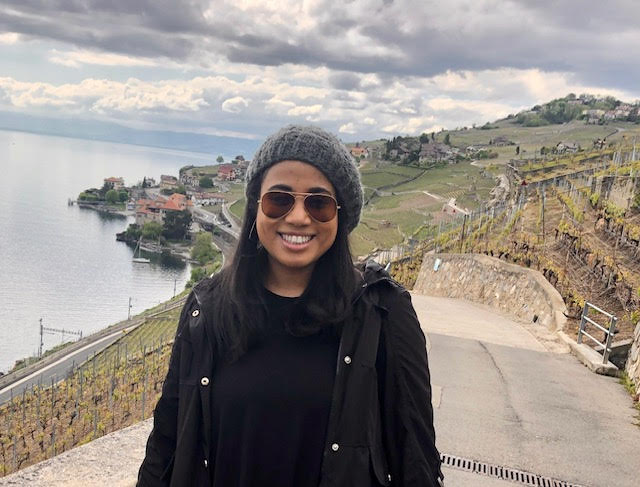 Allison: Yes, I applied for a Roots Fund WSET scholarship back in 2020, part of the first cohort of students. I went on an enrichment trip with a group to Champagne. We visited some big Champagne houses and grower producers. It was a really special opportunity. I had never been in that level of wine experience with a lot of other people of color. I grew up in Canada, not around a lot of Black people. And nowhere in my professional experience had that happened.
Allison: Yes, I applied for a Roots Fund WSET scholarship back in 2020, part of the first cohort of students. I went on an enrichment trip with a group to Champagne. We visited some big Champagne houses and grower producers. It was a really special opportunity. I had never been in that level of wine experience with a lot of other people of color. I grew up in Canada, not around a lot of Black people. And nowhere in my professional experience had that happened.
(Rachel Allison in Champagne, on a trip with The Roots Fund)
GC: What are you doing with wine now, outside of your management consulting work?
Allison: I’ve been organizing wine tastings at work a lot, for different employee resource groups. I’ve been doing corporate tastings for fun and community. I love to share knowledge, speaking and teaching. A lot of people I meet are interested in learning about wine. I try to orient my tastings with my science framework to talk about how we think about and taste wine. It’s not a chemistry talk but maybe it’s 25 percent geology or history. I came to this interest as a flavor-chemist person. Now I’m firmly a wine person. Wine attracts people who love to learn. Tomorrow it’s going to be different. It’s energizing.
GC: So now that you have your doctorate, do people refer to you as Dr. Allison?
Allison: I don’t work in the academic space so I’m rarely called doctor, but it’s always been like a funny point. Nine of my 10 closest friends are from grad school and we only call each other doctor like a joke. With anything related to science, my research, I try to make a point of writing my name that way and asking to be addressed that way especially because they almost automatically call the men doctors, but not the women.
If I’m on a plane and they ask if there’s a doctor, I wouldn’t be terribly helpful, although they now serve canned wines on flights so if someone had a wine in a can I could probably help them.
Dorothy J. Gaiter and John Brecher conceived and wrote The Wall Street Journal's wine column, "Tastings," from 1998 to 2010. Dorothy and John have been tasting and studying wine since 1973. In 2020, the University of California at Davis added their papers to the Warren Winiarski Wine Writers Collection in its library, which also includes the work of Hugh Johnson and Jancis Robinson. Dottie has had a distinguished career in journalism as a reporter, editor, columnist and editorial writer at The Miami Herald, The New York Times, and at The Journal. John was Page One Editor of The Journal, City Editor of The Miami Herald and a senior editor at Bloomberg News. They are well-known from their books and many television appearances, especially on Martha Stewart's show, and as the creators of the annual, international "Open That Bottle Night" celebration of wine and friendship. The first bottle they shared was André Cold Duck. They have two daughters.
Banner by Piers Parlett
